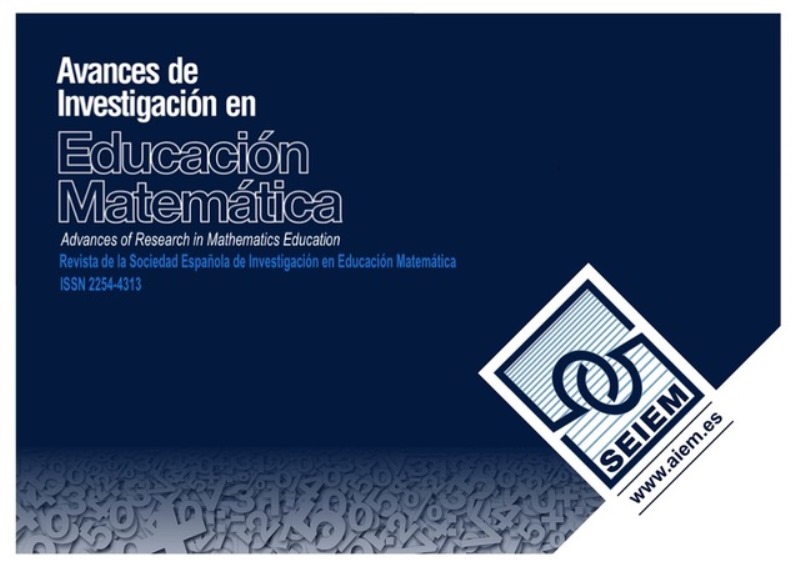Study on the cognitive construction of the change of basis matrix in terms of APOS Theory
DOI:
https://doi.org/10.35763/aiem20.4011Keywords:
Genetic decomposition, reflexive abstraction, change of basis, linear algebraAbstract
This article shows the construction of the change of basis matrix in linear algebra. Based on the APOS theory as a theoretical and methodological framework, the structures and mental mechanisms are described to obtain a genetic decomposition based on the conceptions that students have about such a concept. A diagnostic test was applied to 28 undergraduate students (18-21 years of age). Semi-structured interviews were also conducted. The results show at least two trajectories in the construction of change of basis matrix concept, which differ in the internalization of mental actions.
Downloads
References
Anton, H. (1994). Introducción al álgebra lineal. Editorial Limusa. https://doi.org/10.1007/978-1-4614-7966-6
Arnon, I., Cottrill, J., Dubinsky, E., Oktaç, A., Roa, S., Trigueros, M. y Weller, K. (2014). APOS Theory. A framework for research and curriculum development in mathematics education. Springer.
Dubinsky, E. (1991). Reflective abstraction in advanced mathematical thinking. En D. Tall (ed.), Advanced mathematical thinking (pp. 95-123). Kluwer Academic Publishers. https://doi.org/10.1007/0-306-47203-1_7
Florey, F. (1980). Fundamentos de álgebra lineal y aplicaciones. Prentice-Hall.
Grossman, S. (2008). Álgebra lineal. McGraw-Hill.
Hillel, J. (2000). Modes of description and the problem of representation in linear algebra. En J. L. Dorier (ed.), On the teaching of linear algebra (pp. 191-207). Kluwer Academic Publishers. https://doi.org/10.1007/0-306-47224-4_7
Hillel, J. y Sierpinska, A. (1994). On one persistent mistake in linear algebra. En J. P. Ponte y J. F. Matos (eds.), Proceedings PME18 (vol. 3, pp. 65-72). PME.
Hoffman, K. y Kunze, R. (1973). Álgebra lineal. Prentice-Hall.
Montiel, M., Wilhelmi, M. R., Vidadkovic, D. y Elstak, I. (2012). Vectors, change of basis and matrix representation: onto-semiotic approach in the analysis of creating meaning. International Journal of Mathematical Education in Science and Technology, 43(1), 11-32. https://doi.org/10.1080/0020739X.2011.582173
Parraguez, M., Lezama, J. y Jiménez, R. (2016). Estructuras mentales para modelar el aprendizaje del teorema de cambio base de vectores. Enseñanza de las Ciencias, 34(2), 129-150. https://doi.org/10.5565/rev/ensciencias.1950
Poole, D. (2011). Álgebra lineal. Una introducción moderna. Cengage Learning.
Roa-Fuentes, S. y Oktaç, A. (2012). Validación de una descomposición genética de transformación lineal: Un análisis refinado por la aplicación del ciclo de investigación de la teoría APOE. RELIME, 15(2), 199-232.
Selby, C. (2016). Where am I? A change of basis project. PRIMUS. Problems, Resources, and Issues in Mathematics Undergraduate Studies, 26(1), 29-38. https://doi.org/10.1080/10511970.2015.1033796
Trigueros, M. (2005). La noción de esquema en la investigación en matemática educativa a nivel superior. Educación Matemática, 17(1), 5-31.
Trigueros, M., Maturana, I., Parraguez, M. y Rodríguez, M. (2015). Construcciones y mecanismos mentales para el aprendizaje del teorema matriz asociada a una transformación lineal. Educación Matemática, 27(2), 95-124.
Trigueros, M. y Oktaç, A. (2019). Task design in APOS Theory. Avances de Investigación en Educación Matemática, 15, 43-55. https://doi.org/10.35763/aiem.v0i15.256
Downloads
Published
How to Cite
Issue
Section
License
The articles published in this journal are under a license Creative Commons: By 4.0 España from number 21 (2022).
Authors who publish with this journal agree to the following terms:
- Authors retain copyright and keep the acknowledgement of authorship.
- The texts published in this journal are – unless indicated otherwise – covered by the Creative Commons Attribution 4.0 international licence. You may copy, distribute, transmit and adapt the work, provided you attribute it (authorship, journal name, publisher) in the manner specified by the author(s) or licensor(s). The full text of the licence can be consulted here: http://creativecommons.org/licenses/by-nc/4.0.
- Authors are able to enter into separate, additional contractual arrangements for the non-exclusive distribution of the journal's published version of the work (e.g., post it to an institutional repository or publish it in a book), with an acknowledgement of its initial publication in this journal.
- Authors are permitted and encouraged to post their work online (e.g., in institutional repositories or on their website) prior to and during the submission process, as it can lead to productive exchanges, as well as earlier and greater citation of published work (See The Effect of Open Access).









